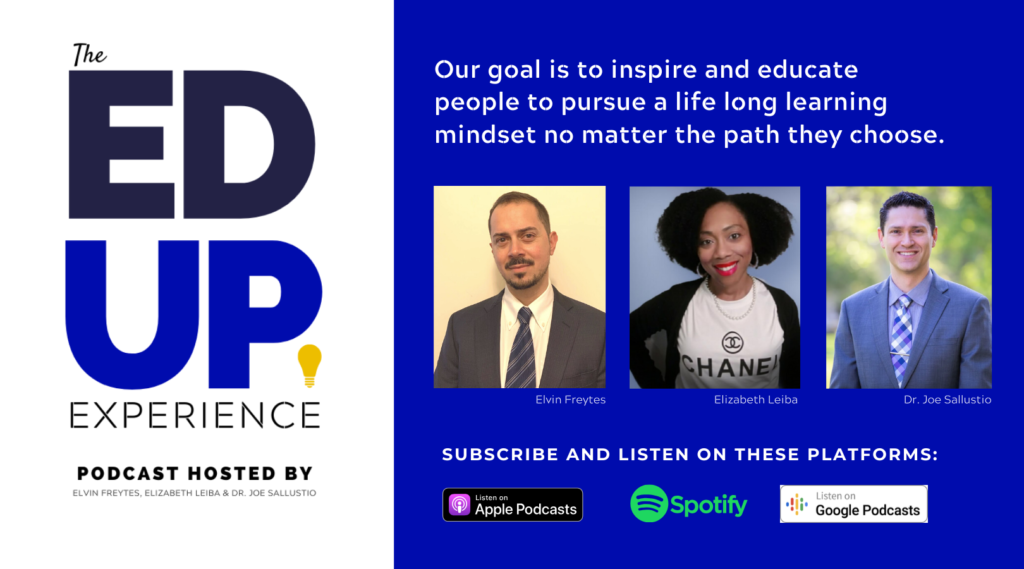Published on
The Value of STEM Programs in Higher Education

STEM education has carved out its place in higher education and will continue to have a strong presence as technology continues to be part of our daily lives. But institutions should also begin to look at incorporating the humanities into this type of programming to deliver the best education that will give learners the skills employers are looking for. In this interview, Dr. Joe Sallustio and Elizabeth Leiba speak to Brad Sims about creating more diversity in the STEM fields, incorporating technology into the job market in the future and meeting employer needs.
EdUp Experience: Can you tell us a little bit about Capitol Technology University?
Brad Sims (BS): We’re a small, private, non-profit university located in Laurel, MD., which is about 15 miles north of Washington, DC. It started in 1927, when a navy veteran retired and began teaching other folks about building radios. So, it’s always been technology-focused. It moved to Laurel in the early 80s.
Over the years we’ve expanded only in STEM-related programs. All of our programming, from undergraduate to graduate, are based around some STEM area or management of STEM. That’s been great for our graduates because our focus here at Capitol Tech is to provide a good career—no matter how old you are. We want to help you have a career that pays well and through which you can advance. We have an 80% placement rate within six months for all undergraduates, which is considerably high.
Over the years, we slightly shifted away from radios but kept the electronics and electrical engineering components. We also added many other specialty fields. Our newest ones are counter-terrorism and critical infrastructure, and our cybersecurity is just going through the roof with all of our different degree programs in that. So, we’re very proud of what we do here in the STEM area.
EdUp Experience: What can we do as a country to move towards increased diversity in your area of specialization, as far as the STEM fields?
BS: We’re over 50% minority when you add up everybody together, and a large number of those are Black students. The area that I would like to increase is the female demographic—we’re at about 24%. My experience has been that if you have a minority student or female student in the STEM area, they get more job offers. They sometimes get even higher starting salaries because the market needs them.
We also have internships, so most of our students are going to have work experience with at least one company before they walk out the door. It’s about allowing students to see themselves in a specific career. And it’s a challenge to sell this image to students who don’t have experience or know anyone in the STEM field. So, you also have to consider how to illustrate the value of these careers to potential students and families.
We have a huge variety of students that we can engage with in this region, and a large volume of companies to connect them with. It’s about showing the students what these careers are like and connecting them to industry people working in them every day to really get an understanding of the roles.
EdUp Experience: On your website, every job is technology-related—is that a way for you to communicate the importance of learning technology?
BS: In the near future, every high school student will have to come out knowing how to code. That’s going to be part of K-12, with the rate at which technology is advancing. There’s no way you’re going to be able to work without being involved in technology somehow.
We added critical infrastructure degree areas because we work with Department of Homeland Security, and they have the critical infrastructure sectors. All facilities are driven by technology and all the equipment in those facilities is operated by technology. So, you need to know all aspects of how these facilities function because today, the cheapest way for a foreign entity to attack you is through the digital space.
EdUp Experience: What impact do short-term or non-credit certificates have on industry and degrees?
BS: There’s a lot of value in both short-term credentials and earning a degree, and it depends on the person. Sometimes, students need to live away from home and expand their social skills while earning their credentials. But if someone can get a job right away in a technical field, why not enter that career? They’re able to gain experience right away and then see if it’s something they want to continue or work towards that degree or something else.
We do that with our traditional students through our internship program. Both provide a great opportunity to feel out a field and the credentials required to continue along that career path. Students need to work to find out if it’s for them, because a master’s degree can be used to either enhance your career or change it.
EdUp Experience: What are the employers say about degrees right now, particularly STEM?
BS: It’s still highly valued. In the past, there was a huge shortage in cybersecurity. So, companies now are more willing to hire you without a degree because they have urgent need. But employers still value the four-year degree and love internships on top of your academic resume as well. Even with a traditional-aged student who has a four-year degree, employers are looking for work experience.
Employers want to hire self-motivated individuals. They also value good oral and written communication skills. So, we include a lot of that as well, because even if you don’t end up in the technical area anymore, all employers want those skills anyway. And four-year degree programs usually teach different arrays of these skills. This way, employers know their hires can stand up in front of a group, do a presentation, write a good report, whatever. So, completing your degree is a plus, especially in a technical area. Before the virus, there were so many job openings out there for all the technical fields. We’re still seeing high employment rates. But there is huge demand especially in cybersecurity.
EdUp Experience: What advice would you give to schools thinking about being more supportive or continuing to be supportive of their students?
BS: It’s a challenge for each university to figure out how to adapt. Some of our benefits are that we’re small, non-profit, and we can be flexible. My goal is to keep our university up to date with current market demands. We can do that because we’re very entrepreneurial. We’re also focused on customer service, so we’re always looking for ways to support the student. Whether they’re earning a bachelors, masters or doctorate, we want to help them be successful and advise them on their chosen path.
In our doctoral programs, we have the deans talk to each student individually, as do the chairs and their committees. We have minimum requirements for how much they have to work with them one-on-one. So, to me, it’s more about trying to provide that feeling of support.
EdUp Experience: What do you think the future of higher education is going to look like?
BS: When I graduated with my bachelor’s degree in construction management, I worked around the U.S. in industrial construction. I then decided to go back to school to the University of Florida, get my master’s degree and go back to industry. While I was doing that, I had an offer to get my doctorate as a graduate instructor, which meant that they paid me to get my doctorate and paid me a salary on top of it. I was a first-generation student in my family. And with that experience, I went to college to obtain a good career. That philosophy is one all of higher education is starting to adopt—being flexible and entrepreneurial, and looking at how higher ed can have a closer connection to industry.
A great example that I can think of is blending degree programs. Whenever I was at another school, I had a manufacturing engineering technology program and I was trying to work with the English majors in another college. I thought that if the English majors completed a minor in manufacturing engineering technology, they could go directly work in the communications department at a manufacturing corporations, already knowing the industry.
So, that blending of the technical with their traditional degrees and connecting the industry is where higher education is going to succeed. As we all know, the expense of going to a university continues to increase, and you need a guaranteed return on investment to feel comfortable spending on a university. So, how do you make that connection? Well, you connect the industry segments. That’s important as well because the United States has to have a positive economy to keep things rolling. So, you’re really a part of the United States economy by connecting to the industry that drives the future of the country and everything we’re doing.
EdUp Experience: Is there anything that we missed about Capitol Technology University that you’d like to talk about?
BS: There’s always going to be a need for the big research universities. But for universities like mine, the future is about creating symbiotic relationship with our industry and our government contractors to drive the economy forward. Capitol Tech is unique. We use a large additional group of working industry professionals as our adjuncts. It’s great because they’re listening to people working in industry while they’re teaching their classes. And that connection to the industry here is fantastic since we’re located between NSA and NASA headquarters. A large number of our graduates end up working at one or the other.
We are here to help you get a good, well-paying career to take care of yourself and your family for the rest of your life.
This interview was edited for length and clarity.
Listen to the full interview here.
Disclaimer: Embedded links in articles don’t represent author endorsement, but aim to provide readers with additional context and service.

Author Perspective: Administrator



